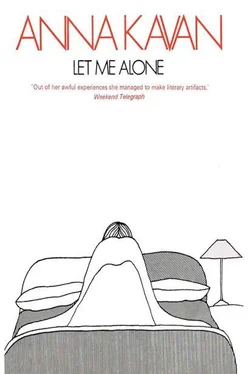The family of Lise was indignant. They consoled themselves, however, with the thought that they had never approved of the marriage. And they prepared to receive the motherless infant.
But now the aggravating eccentricity of James’s character manifested itself. He refused to part with the child. To an impressive old lady of the impoverished Austrian nobility, and a very charming young one who was Lise’s sister, he courteously and determinedly announced his intention of keeping the baby himself. And finally they had to go away, beaten. Though anything more incongruous than the association of an infant in arms with this cold, severe, grey-faced man would be difficult to imagine.
Why did he want the child? Perhaps only from the perverse desire to annoy them all; perhaps from some dubious secret feeling of responsibility; perhaps from some motive still darker and more obscure. In any case, his mind was made up.
A Miss Wilson appeared; one of those inevitable middle-aged British spinsters who always seem to be at hand where a baby is concerned, ready and eager to devote to its care thankless years of unprofitable self-sacrifice. Miss Wilson was like all the rest, inconspicuous and unassertive, with timid, pale eyes in her sharp, pale face. She was terrified of James and devoted to Anna.
With the last remnant of his fortune James bought a small farm in the eastern Pyrenees. He was fond of mountains; and the district was rough, wild, unfrequented by tourists, and very far from anywhere where an old lady of the Austrian nobility would be likely to travel. The place was called Mascarat.
It was very different from any of his previous residences: a strong old Spanish-looking farm with rough wood floors and whitewashed walls, and the sloping wall of the mountain bordering the small domain. At the back of the house, beyond the vineyard, grew almond and cherry trees, and there was a bright ribbon of water in the stony ravine. In front were two more vineyards and a stretch of grass-land running down to the little chestnut-forest beyond the stream. At the far end of the valley the mountains stood up, blue and rather unreal, fold after fold, seventeen separate slopes rising one behind another, to the vast, dim, improbable peaks of snow that floated like strange white scarves upon the distant blueness.
Here was Anna’s home, her earliest consciousness, this rough, dark, lonely house; this great wild background of mountains pale or brilliant in the sun, or blackly threatening in the stormy weather, the noisy water and the yellow vineyards, the theatrical splendour of the shadow-pale, far-off snows.
And this was the home of James Forrester, the man whose wealth and extravagance had almost become a legend, the man who had lived like a prince in every European capital, who had bought and tired of half-a-dozen great houses.
Sometimes, as he stood on the rocky, bush-grown slope, and looked at Mascarat lying like an insignificant patch on the huge tapestry of mountain and forest, he smiled to himself, a thin, inward smile of extreme ironic bitterness mingled with a semi-masochistic satisfaction. He had tried the life of the world, the life of luxury and wealth, and he had had no pleasure in it. Now he was trying the hermit’s life to see what that had to offer. But sometimes his face wore an expression that was neither good nor pleasant to see.
The small Anna lived entirely under the ægis of the admirable Miss Wilson. For several years her life, waking, sleeping, playing, in the big, bare, dark rooms, or out in the wide stretches of brilliant sun, was governed and bounded by the pale, watchful, anxious face and the quick, nervous voice of Miss Wilson. Outside, on the fringes of her existence moved — huge, spectral and unreal in their comings and goings — three other figures: her father, tall, silent and grey-faced, rather frightening in his stern remoteness; then Seguela, the old peasant-woman, black, untidy, going about with flopping, ungainly speed, like an old crow; and her son Paul, a queer, staring, animal sort of fellow who did not usually appear indoors until the evening. But between Anna and these people, the small, flat, colourless figure of Miss Wilson was always swooping forward, swooping down with a strange incongruous fire of maternal, protective anxiety in her pale eyes, her humble spirit roused to pugnacity on behalf of her charge.
Against all her instincts, Miss Wilson had become a warrior in those days. She sometimes wondered fearfully at the change which had overtaken her gentle, abject, old-maid’s heart. She had only one loyalty: her love for Anna. Only one determination: to do battle against the powers which she obscurely felt to be ranged against Anna. Only one fear: that she might be sent away from Anna.
Suddenly, one mild spring day, an incident occurred. It was one of the first of Anna’s definite recollections; and it served to bring her father out of the shadows into a position of importance in her childish scheme of life.
It was early March and the rains had been heavy for several days. Now the sun shone vividly, bringing out the pristine colours of the world. The distance stood sharp on the clean, rain-washed air, distinct, clear-cut but fragile-looking as egg-shell, very far away. And the great crumpled sea of mountains, like a pile of crumpled drapery, fold behind fold, stretching away to the ultimate distance, to the unsubstantial dim-white snows.
Anna was playing beside Miss Wilson on the bright green grass of the upper valley where it narrowed to the neck of the gorge. Some goats, soiled-white and russet-brown and black, were feeding near. The high walls of the gorge towered savagely, silent and rather sinister in the bright glare of the sun. The slowly-passing, sunny morning was very silent; almost ghostly in stillness and silence.
Then a sound came; a strange tearing, roaring sound, far off in the sky it seemed, growing swiftly to a crashing thunder. In amazement they looked up at the cloudless, blank blue sky. There was nothing there. But on the crest of the cliff, on the ragged summit of the mountainous wall of the gorge where the great rocks stood up in sombre heaps with the dark bulks of greenery between, Anna saw a strange ball rolling. Like a weird, irregular ball it came bounding, bouncing down the sheer stony slope, leaping like a mad thing down the cliff. It was funny to see it. Anna would have laughed. But before her lips had time to stretch to a smile, the bounding ball had become a lion, an elephant, a house, an immense primeval mass of solid rock bearing down with terrifying speed straight upon them.
Miss Wilson’s timorous heart seemed to turn over in her breast. God knew she had done her best, had striven — with heroism when the limitations of her temperament are considered — against the difficulties and alarms of the past few years. But now, when actual physical danger threatened, danger so horrifyingly imminent that her elderly mind had barely time to conceive it, she did not know what to do. So she stood still, doing nothing at all, simply clasping Anna against her body in the immobility of utter unthinking panic.
And at the very last moment, when the great cruel mass seemed almost upon them, ready in a blind rush of destruction to blot out for ever the obscure old life of the maiden lady and the other life that had hardly begun, a strong hand dragged them away. The huge boulder crashed past with a noise like thunder, down into the green hollow below, where it seemed suddenly to fall in pieces, raising clouds of yellowish dust.
The goats had moved on a little way, such a little way, only a few steps it seemed, out of the course of the falling peril, and were quietly feeding. The small, sharp tearing noises as they cropped the grass sounded clearly in the empty silence.
‘Lucky for you that I happened to be near,’ said the calm, cold, somewhat sardonic voice of James Forrester.
Читать дальше












